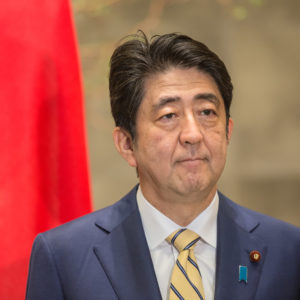Japanese conservatism is like a seething volcano, spewing smoke and ash but not quite ready to erupt. The reluctance reflects the great ambivalence in Japanese society. Japanese are fundamentally conservative, united in a culture dedicated to hard work and formal relationships but otherwise undecided about where they are going politically and militarily as a regional or even world power.
It’s a tribute to the conservative nature of Japanese society that Shinzo Abe now rules as Japan’s longest-serving prime minister. The phenomenon of stability nurtured by a deep desire to stick to the policies that have powered Japan’s renaissance as a world power after the disaster of the Pacific War help to explain why Abe has maintained his grip.
Abe brings a new kind of nationalism to the Japanese scene. He definitely stands for the traditional powers that guided Japanese leaders from the time of the Meiji restoration in the 1860s through the imperial takeover of other Asian countries, including Korea, but he avoids the strident right-wing extremism that led Japan to wage war against some of the world’s strongest countries, notably the United States, in the 1940s. Japan does have a clique of right-wingers, as seen in the Japan First Party, but Abe is not quite one of them.
Abe does appeal, however, to nationalist instincts. He has seized upon the deep-seated, almost instinctual popular belief that Japanese forces fought well in the Pacific War and would have prevailed had the Americans not inflicted the terrible tragedies of the atom-bombing of Hiroshima and Nagasaki. If there were a slogan for Abe’s form of nationalism, it might be to borrow Trump’s call to “Make America Great Again” and adapt it to Japan under the banner, “Make Japan Great Again.”
He has accomplished success by his skillful politicking between reformist and conventional elements in the ranks of the long-ruling Liberal Democratic Party, which has been in power, except for brief periods of socialist rule, since Japan’s surrender in August 1945 and the imposition of the post-war constitution by the conquering commander of the American occupation, Gen. Douglas MacArthur.
In a real sense, Abe owes his conservative philosophy to his grandfather, Nobuske Kishi, who had been imprisoned by the Americans as a Class A war criminal for his cruel rule over Manchuria, the artificial state of Manchukuo during the war. So well did Kishi get along with the American conquerors that they got him out of prison and into political life at the highest level. Kishi directed his nationalism to making Japan one of the world’s largest, most vibrant economies, as did his younger brother, Eisaku Sato, who became prime minister several years after Kishi stepped down.
Abe’s father, Shintaro Abe, sometimes considered for prime minister, had as foreign minister focused on economic ties, negotiating sometimes bitter trade disputes as Japan built strong balances with almost all countries, especially the United States.
Abe’s international reputation as a rightist figure stems not only from his success at economic reform but also from his intense desire to get rid of Article 9 of the post-war “peace constitution,” written and imposed on Japan by MacArthur’s inner circle. The curse of Article 9, for Abe, is that it prohibits Japan’s armed forces from going overseas, much less fighting a foreign war. The words, “The Japanese people forever renounce war as a sovereign right of the nation” and “land, sea and air forces, as well as other war potential, will never be maintained,” are embedded into the psyches of all Japanese from childhood.
Japan has long since abandoned adherence to Article 9 in the strictest sense. Japanese Self-Defense forces — air, ground and naval, comprising nearly 250,000 troops — now make up one of the world’s strongest, best equipped military establishments. Abe, however, would like to go further, if not by rescinding Article 9, then by reinterpreting it so Japanese forces can indeed go beyond their home territory in the interests of defense.
He is frustrated in achieving this goal, however, by the simple fact that a significant majority of Japanese do not want to revise Article 9 at all. Japanese do not believe a war will break out in the near future, whereas Abe stresses the need for security as long as North Korea’s Kim Jong-un orders tests of missiles that might easily carry nuclear warheads aimed at targets anywhere in Japan.
The legacy of Japanese colonial rule over Korea for 35 years until Japan’s surrender at the end of the Pacific War rules out a trilateral alliance between Japan, the United States and the Republic of Korea, but Abe sees intelligence-sharing with South Korea as important for security. Korea’s decision not to withdraw from the General Security of Military Information Agreement was greeted in Tokyo as a triumph for Japan. Abe, however, wants much greater military security as he leads Japan from dependence on the United States, which maintains separate alliances with both Japan and Korea.
In fact, Abe may get his way thanks to President Trump’s demands that Japan and South Korea vastly increase their contributions to the cost of maintaining U.S. forces and bases in both countries. If Trump were to reduce the number of U.S. troops in Japan, now about 50,000, Abe would insist more fiercely than ever that Japan needs to be able to make up for the loss by deploying its own forces overseas where and when needed.
Obviously North Korea and China would be major concerns. Full-fledged Japanese militarism, under the conservative, nationalist Abe, could well be the unintended consequence of Trump’s hard bargaining.

